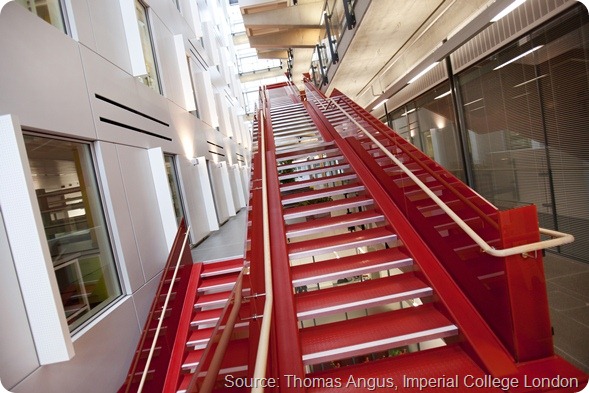May 28 2012
A major new research facility at Imperial College London designed to expand and accelerate the translation of scientific discoveries into new ways of preventing, diagnosing and treating diseases was officially opened by George Osborne MP, Chancellor of the Exchequer, today.

The £73 million Imperial Centre for Translational and Experimental Medicine (ICTEM) combines laboratory space for up to 450 scientists with a dedicated facility for evaluating and developing new medical treatments through clinical trials.
The six-storey building is located on Imperial's Hammersmith Campus, alongside Hammersmith Hospital. It is 500 metres from the College's new campus, Imperial West, which is being developed to grow the Imperial's research and education activities in west London.
The upper floors of the building constitute one of the largest cardiovascular research facilities in Europe, including the headquarters of the British Heart Foundation Centre of Research Excellence at Imperial. One of the areas of focus in this unit is to develop stem cell treatments to help the heart repair itself after a heart attack.
The second floor, occupied by teams from the Medical Research Council Clinical Sciences Centre, houses next-generation gene sequencing machines, which are helping researchers to develop improved methods for preventing, diagnosing and treating common health problems such as heart disease and raised cholesterol.
The building is also home to the Imperial Cancer Research UK Centre, which brings together chemists, biologists and engineers who are working on new ways of tackling cancer, such as molecular imaging techniques that help doctors match treatments to patients and methods to reduce the toxicity of radiotherapy.
On the ground floor of the building the Wellcome Trust-McMichael Clinical Research Facility incorporates two wards where patients and healthy volunteers can work with researchers to evaluate new treatments.
The opening of the Centre, built over four years with support from the British Heart Foundation, Imperial College Healthcare NHS Trust, the Medical Research Council and Wellcome Trust, marks the fruition of the College's largest ever investment in research facilities. ICTEM is a flagship facility for the Academic Health Science Centre, the College's partnership with Imperial College Healthcare established in 2007, which aims to ensure that new discoveries and technologies are translated into new therapies as quickly as possible. Researchers in the new building will work closely with engineers and scientists across Imperial to generate innovative solutions to health problems.
Sir Keith O'Nions, President & Rector of Imperial College London, said: "The Imperial Centre for Translational and Experimental Medicine is a physical manifestation of our commitment to bring benefits to society through the application of knowledge. It is our Academic Health Science Centre in action. Under one roof, next to a major hospital, hundreds of scientists are dedicated to making new discoveries. Their mission is to find new ways of preventing, diagnosing and treating diseases that blight the lives of millions across the world. In doing so they will not only improve people's health. They will also bring benefits for the economic health of the country, driving drug discovery work and interacting closely with the pharmaceutical and biotech industries. The impact of the Centre's work will be felt by populations locally, nationally and internationally."
Speaking at the opening ceremony, the Chancellor George Osborne said: "It's an honour to open this new Imperial Centre for Translational and Experimental Medicine. It is what this country's vision for the future of life sciences is all about.
"This new Centre rises to the challenge of ensuring we remain a world leader in life sciences. The future is academic research, clinical practice and industrial application coming together.
"Our future depends on the work going on at Imperial and in world class labs like this across the country. Not just the future of our scientific communities but also the important contribution that they are making to the future of this country's industry, growth and jobs."
Source: www.imperial.ac.uk